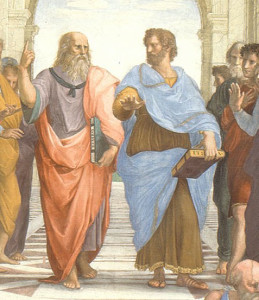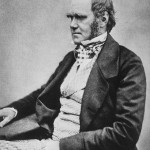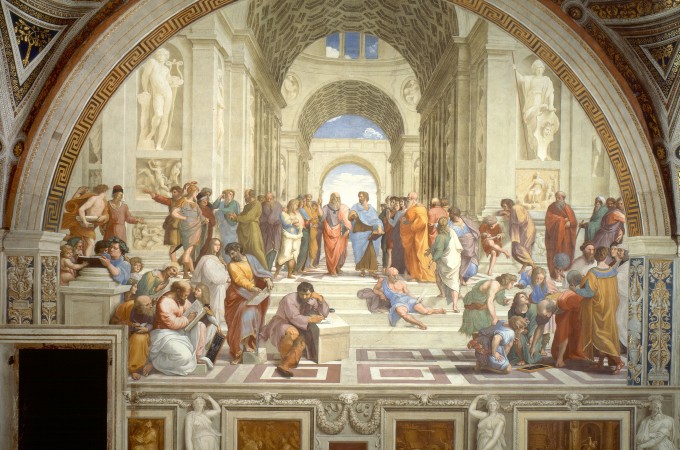The School of Athens by Raphael
What is the meaning of life? Where is this meaning to be found? Such questions, still highly relevant, have been kicked around for a long time.
Some well-known, ancient Greeks had a lot to say about this question.
Aristotle led the discussion about the use of the senses to examine our surroundings and gather data. Plato was big on the use of the mind or reason to bring order and meaning to the data.
 Raphael’s famous painting, The School of Athens, depicts some intriguing details which capture the difference between the views of these two Greek philosophers. In the enlarged inset we see Plato (on the left) and Aristotle (stage right).
Raphael’s famous painting, The School of Athens, depicts some intriguing details which capture the difference between the views of these two Greek philosophers. In the enlarged inset we see Plato (on the left) and Aristotle (stage right).
Note their right hands. Plato is pointing upward, toward the heavens. He wanted to understand the meaning of things. His focus was philosophy (as opposed to Aristotle’s focus on knowledge through the senses).
Plato said that behind each fact is the idea of the thing. Behind the chair is the idea of chair. What’s important is not any particular chair but the concept of chair. Plato was the father of Idealism. He believed in the transcendent nature of truth and the related virtue of reasoning.
Plato’s philosophy included room for a reality beyond the senses, something transcendent of space and time. In fact, for him, goodness, truth and beauty are all originally sourced beyond this world.
Aristotle’s hand, however, is extended forward with his fingers held horizontally. By this posture, Raphael was indicating Aristotle as the father of Realism. Contrary to Plato’s emphasis on philosophy and meaning, Aristotle taught the importance of knowledge, the preeminence of facts. Truth was factual, rather than transcendent. Truth dealt with facts; what we know from our five senses comprises what is important.
Contrary to Plato’s other-worldly teaching, Aristotle was concerned with this world. He cared about the practical nature of truth discovered by the senses. For him, the material, “solid” world was what mattered.
That debate continued for hundreds of years, with Plato mostly winning. Until the Enlightenment, when the weight went to Aristotle and the scientific method was born.

Today our lives are framed by the Darwinian narrative, the progeny of Aristotle. Every student of public education, from grade school through university, has been influenced by Darwin’s attempt to account for the facts of the universe apart from God. Spontaneous generation seeks to answer the What, (Aristotle’s facts) but it does not get to the larger questions of metaphysics.
In a universe in which God does not exist, neither does any purpose exist. We are here by accident. There is no meaning, not in things and not in an individual life.
Of course atheists cannot live with the implications of such a worldview. They live as if there is real meaning in their own lives: they act as if love is genuine, they care for their families, they mourn the loss of friends. They also judge people by some kind of ethical standard. They must live this way. Facts without meaning, after all, result in chaos and encourage anarchy. Because no society can long endure anarchy, people turn to substance abuse or amusement to dull their senses against despair.
Many people have perfectly healthy eyes yet fail to make sense of what they are seeing. In other words, they have eyes but they cannot see. They know, but they lack understanding.
To see without understanding what we see is very common. We all do it daily.
In 1989, futurist Joel Barker produced a training video for business leaders, “The Business of Paradigms,” in which he argued that we sort the various pieces of our life into paradigms. That’s one way we cope with the flood of information around us. Paradigms are helpful for processing information, but paradigms also render invisible what should be obvious. A scientist, for example, peers through his microscope at a sample and does not see the evidence literally in front of his eyes because it does not fit the preconceived framework—his paradigm—that undergirds his work.
 Not only scientists do this. My wife, Marilyn, worked for many years as a labor and delivery nurse at a Phoenix hospital. One day she was called to the emergency room to assist with a mother in premature labor. Sadly, the baby was stillborn. The remarkable thing was what happened at the moment of birth. An ER staff nurse, apparently new to obstetrics, exclaimed, “My God, it’s a baby!”
Not only scientists do this. My wife, Marilyn, worked for many years as a labor and delivery nurse at a Phoenix hospital. One day she was called to the emergency room to assist with a mother in premature labor. Sadly, the baby was stillborn. The remarkable thing was what happened at the moment of birth. An ER staff nurse, apparently new to obstetrics, exclaimed, “My God, it’s a baby!”
Of course every nurse is taught about fetal development. But for this woman, the distortion of our modern abortion culture effectively nullified her education! She believed that what a woman carries in her womb is “tissue,” a “product of conception.” She was shocked to participate in the delivery of an actual baby.
Atheist assumptions aside, there is transcendent meaning. Truth, and goodness, and beauty … yes, and human babies … are real.
What are some practical ways in your life this week that you can:
- tell the truth?
- do good?
- create beauty?
– from a forthcoming book by Darrow and Gary Brumbelow






